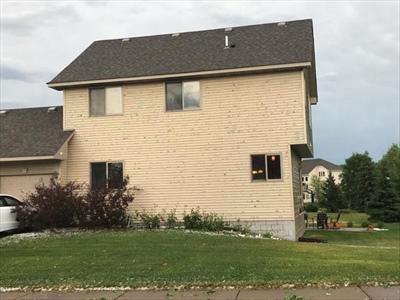Blog
June 11, 2017
Meet the Team of Trinity Exteriors

Large hail storms, like the one seen Sunday in Coon Rapids and Brooklyn Park, tend to draw disreputable contractors from around the country looking to cash in on insurance claim money from homeowners struggling to get their roof restored. Many times these cases make the news, where a company will take a homeowner’s deposit and then completely skip town, or do the work and do it so badly but be completely unreachable afterward for repairs. Trinity Exteriors, Inc wants to make sure North Metro homeowners aren’t among those being taken advantage of after the most recent storms. Here are some guidelines for avoiding those situations.
1) Ask for Recommendations: Your family, friends, coworkers and neighbors likely have had their roofs done at some point and can either recommend somebody that worked very well for them, or tell you horror stories of contractors to avoid.
2) Look for a Local Company: Big storms tend to draw contractors from all over the country who want to capitalize on homeowners looking for quick roof repair. Once these contractors leave town, there is nobody to follow up with potential repairs. A local contractor based in Eden Prairie, Minnetonka, or Linden Hills feels the accountability of working with people in their own town, since a bad reputation can destroy a business. A local contractor will work hard to make you happy, follow up with any repairs and, in general, work to keep your business for positive reviews, referrals, and recommendations. Local contractors will know your region's climate requirements: Denver's weather is different than Edina's, so a contractor just five miles up Highway 100 will know what your home needs better than other contractors.
3) Choose an Established Business: According to Bloomberg, 80% of businesses fail within the first 18 months. A business that has thrived for more than a decade is going to be around in the future to service the warranties for your roofing materials should any problems arise.
Don't let a roofing contractor use your property as a guinea pig—you have to live with that roof for the next 20 years! Look for a company that has been through a few storm seasons, that has had experience working with insurance adjusters and mortgage companies, that is an expert in the capabilities and limitations of the materials going on your house, and that has built up a list of references you can check to make sure the company has your best interest at stake.
4) Research the Contractor Online: Your contractor should have some online presence. A clean and updated website can convey what kind of contractor they are: a thorough contractor who favors clean lines and details or a haphazard contractor who loves a blue background and green writing. A vetted contractor will be a member of the BBB and Angie's List, where you can find more detailed reviews and ratings of the company, as well as other review sites such as Google+, Yelp and Houzz.
5) Pick a Contractor that is Licensed, Bonded and Insured: Seriously. Do not skip this step, no matter how nice the contractor seems or how inexpensive the estimate is. The cheapest bid can end up costing thousands of dollars more when working with an uninsured contractor. A contractor should carry liability insurance, in case they cause damage to your property, and workers comp insurance in the event an employee is injured on your job site. Your homeowner's policy definitely doesn't cover fringe damage to your home caused by a contractor, and your policy may cover an injured employee (after you meet your deductible, of course), but this can result in higher rates.
6) Don't Be Duped by Unethical Contractors: When it comes to insurance restoration, homeowners are only responsible for their deductible. Some unethical contractors offer to pay the deductible, or offer the homeowner a rebate in exchange for a signed contract. Most states, including Minnesota, have legislation against these practices. If a contractor is willing to break this law in the quest for a sale, it's easy to think there are other ethical business practices they are likely to skirt as well, at your expense.
7) Get Everything In Writing: From your initial estimate, to any change orders, to scheduling, make sure the company is consistently communicating with you so you are fully aware of what work is being done on your house, when and why. Even if you aren't personally climbing up the ladder to inspect the work, you should be told what is happening to your property.
Be Wary Of:
1) Promises of significant discounts, rebates for deductibles or "reusing" leftover materials offered at an unbelievably low price.
2) Heavy sales pressure for an immediate decision.
3) A contractor who only accepts cash.
4) A contractor without a portfolio of previous work.
5) A company that seems disorganized, can't keep appointments, or consistently changes your scheduled work without legitimate reason (such as the weather).
6) If you don't like the contractor. If you don't feel comfortable with the person you hire to replace your roof, this may be your intuition telling you something is off. Go with your gut and find someone you feel comfortable working with.
